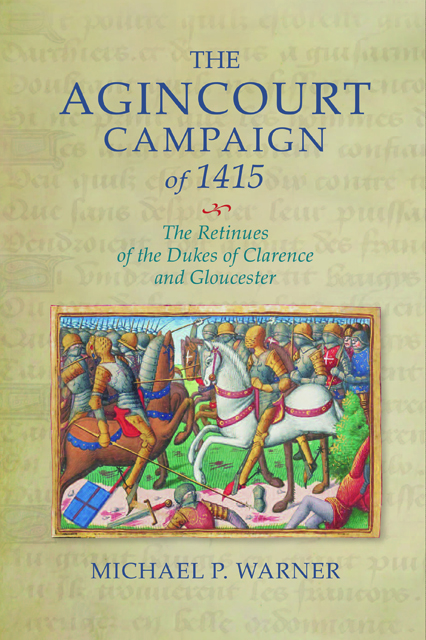Book contents
- Frontmatter
- Contents
- Lists of Tables and Charts
- List of Figures
- Acknowledgements
- Abbreviations
- Introduction
- 1 Before the Campaign
- 2 The Muster Rolls of the 1415 Expedition
- 3 Clarence’s and Gloucester’s 1415 Retinues
- 4 The Sub-Retinue Captains
- 5 During the Campaign
- 6 After the Campaign
- Conclusion
- Appendices
- Bibliography
- Index
- Warfare in History
6 - After the Campaign
Published online by Cambridge University Press: 14 January 2023
- Frontmatter
- Contents
- Lists of Tables and Charts
- List of Figures
- Acknowledgements
- Abbreviations
- Introduction
- 1 Before the Campaign
- 2 The Muster Rolls of the 1415 Expedition
- 3 Clarence’s and Gloucester’s 1415 Retinues
- 4 The Sub-Retinue Captains
- 5 During the Campaign
- 6 After the Campaign
- Conclusion
- Appendices
- Bibliography
- Index
- Warfare in History
Summary
Stepping back on to English shores in late 1415 as battle-hardened soldiers, many of those who had served on the campaign must have been aware that they had been part of a significant event; although few, surely, could have anticipated that the war they had reopened would drag on for another four decades and end in almost total English defeat. The immediate worry for most soldiers, however, was undoubtedly more prosaic and concerned their payment. If they expected the Crown’s accounting machinery to work swiftly, they would have been disappointed. It was not until 9 March 1417, after Henry’s decrees concerning the payment of wages, that Exchequer officials were able to publicly order that all those who had indented for the campaign present their accounts. Some captains, such as Erpingham, did not present their accounts until many years after the campaign. Indeed, Erpingham died in 1428 before having submitted his accounts. They were eventually submitted on his behalf by his executors. In addition to receiving their due pay, two more issues needed to be addressed: money relating to prisoners and the items that had been given as surety for the second quarter’s payment.
Beginning with Clarence’s retinue and prisoners, E 358/6 notes prisoners were taken during the campaign and details that £212 12s 11d was the royal portion of the ransoms (a third of a third of the prisoners taken). This indicates that total ransoms for his retinue may have amounted to somewhere in the region of £1,800, allowing for discrepancies in calculations, missing information or other issues. This evidently large sum indicates many prisoners were taken. However, disappointingly, the document does not detail who took prisoners, or who the prisoners were. Nevertheless, at least three sub-captains are known to have taken prisoners. Stapleton took eight prisoners, while William Bukton was accused after the campaign by two archers named John Craven and Simon Irby of having taken by force their prisoners and ransomed them for his own profit. In November 1416, the king ordered certain accompaniments, such as pots, six goblets and cloth from Paris, to be supplied to Heron ‘for his use by certain prisoners’.
- Type
- Chapter
- Information
- The Agincourt Campaign of 1415The Retinues of the Dukes of Clarence and Gloucester, pp. 156 - 187Publisher: Boydell & BrewerPrint publication year: 2021



